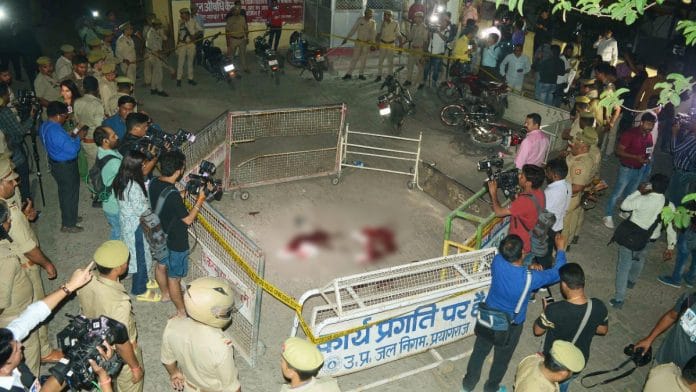Lucknow: Produce ID or Aadhaar card, inform district authorities about visit to site of incident in advance and refrain from organising ‘talk shows’ that could hinder an ongoing probe. A five-member judicial commission formed in the aftermath of the Atiq Ahmed killing has made these recommendations and more to the Uttar Pradesh government.
Ahmed and his brother Ashraf were shot dead in police custody outside Prayagraj’s Calvin hospital on 15 April 2023 by three assailants who breached the security cordon pretending to be media persons. A judicial commission headed by retired Allahabad HC chief justice Dilip Bhosale was therefore tasked with identifying security lapses, if any, and making recommendations on a protocol for media persons covering active probes.
While giving the police a clean chit, the commission concluded that “heavy use of flashlights by media persons had practically blinded the policemen,” adding that despite “best possible efforts”, the police was incapable of keeping reporters away from Atiq and Ashraf in the absence of clear directions to control the media.
In its report, which ThePrint has accessed, the commission recommended that no information be shared with the media about the various stages of investigation and that the media not be allowed to broadcast live movements of the police, accused or victim.
It also advised action against media persons who fail to produce an identity or Aadhaar card or try to cross a barricade put up by the police at the site of the incident. The resulting action could entail confiscation of the camera or mic, read the report tabled in the Uttar Pradesh Legislative Assembly Thursday.
The commission also recommended that media persons who travel to Uttar Pradesh from other states to cover a “sensational incident”, and whose information is not available with local authorities, should “inform district information officer upon or before their arrival”.
In 2020, Kerala-based journalist Siddique Kappan was arrested by Uttar Pradesh Police while on his way to Hathras to cover suspected rape and subsequent murder of a young Dalit woman. Kappan was booked under the stringent Unlawful Activities (Prevention) Act and spent 28 months in prison before he was granted bail.
Also Read: UP gets its 4th acting DGP in 2 yrs — Prashant Kumar has Yogi’s ‘trust’, beat 13 seniors to top spot
Panel’s recommendations for police, media
The judicial commission probing the Atiq Ahmed killing also recommended in its report that media houses inform the district information officer in advance about a team visiting a site for “coverage of a programme/incident/press conference via an email”.
Anyone who “claims” to be a reporter or media person but is unable to furnish an ID or Aadhaar card should not be allowed to cover the event, it added.
For freelance journalists, it recommended that district information officers verify their identity through Aadhaar, PAN card or other documentation.
The commission also suggested a framework for media coverage of a “criminal incident” or “incident of public importance”.
“Media will be regulated and controlled by related officials especially in the case of criminal incident/incident of public importance so that any hindrance in the way of the probe agency can be avoided and those involved in the incident can also be secured,” it said.
Further, it recommended that the media not be allowed to broadcast live programmes that give away information about movement of police, accused or victim.
It also advised police not to share with the media any information pertaining to an active investigation, especially recovery of evidence. “If in any case, the media gets to know of such an activity, it will not telecast such an incident till the accused are taken to the police station after the recovery,” added the commission in its report.
It went a step further to advise the media to “exercise restraint while covering any programme/incident/press conference so that it can be safe from erroneous/wrong/over exaggerated reporting and keeping in view national security and safety of accused/victims”.
The commission further advised the media to “refrain” from organising ‘talk shows’ or running video clippings that may hinder an active investigation, adversely affect or become a reason for a threat to the accused or victim.
(Edited by Amrtansh Arora)






